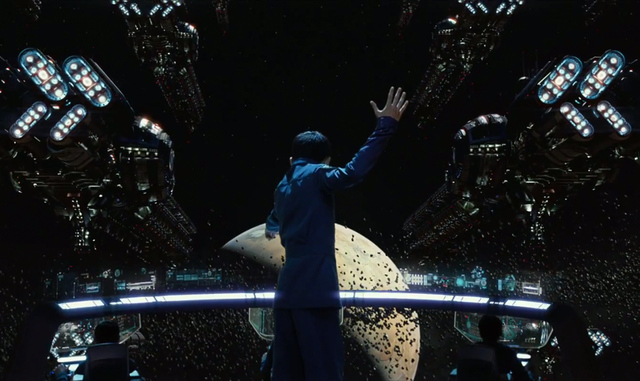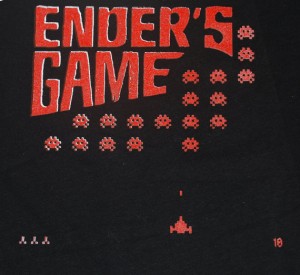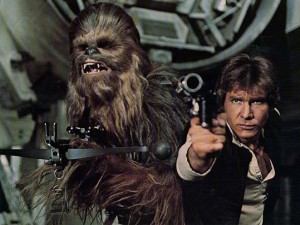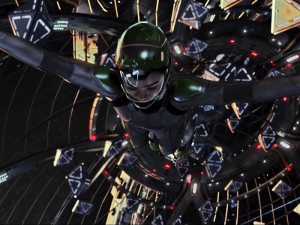
(Source: The Verge)
Editor’s note: Deadshirt.net staunchly opposes author Orson Scott Card’s hateful stance against homosexuals and marriage equality, and respects any individual’s choice to boycott this film. We likewise respect the philosophy that a work, particularly an adapted work, can stand on its own from its creator. This review was written with that in mind, and comments only on the film and the novel on which it is based.
As far as sci-fi action movies go, this one is a keeper. However, if you were a lover of the novel, you may find a few things missing in this adaptation, especially in regards to Peter and Valentine Wiggins. Ender’s Game is a big-budget supernova that plays tribute to the novel with commendable acting, fantastic alien visuals, and tests for the audience and the characters that provoke questions about what it means to be human.
The Premise
(Contains SPOILERS, but you probably read this in 9th grade)
The Earth is attacked by swarms of an insectoid alien race known as the Formics (formic means ant-like, FYI). Fifty years later, children are put through rigorous military training in order to find the best of the best, and prevent a future attack from the Formics. Ender Wiggin (Asa Butterfield) is a third child in a population-controlled society, born to cultivate the potential that his older siblings were unable to deliver. Under surveillance, he passes every test he faces with cool tact, making his way into the elite battle school in the Earth’s orbit.
From the beginning, his commanding officers Graff and Anderson (Harrison Ford and Viola Davis) calculate behind closed doors to groom him for leadership, placing obstacles in his path and testing his ability to handle the stresses of his future position as Battle Commander of the entire fleet. Ender’s brilliant tactics and successes on the Zero-G battle arena win him the support and enmity of his fellow classmates. Ender accidentally kills a bully who attacks him and retreats to the safety of earth, quitting school.
Spurred by the threat of an impending Formic attack, Graff uses Ender’s connection with his older sister Valentine (Abigail Breslin) to bring him back to his final command training at a military outpost in former Formic airspace. To train Ender, Mazer Rackham (Ben Kingsley), a war hero publicly pronounced dead for propaganda purposes, is brought in. Ender’s battle school allies are also brought in to serve as his command post. Ender and his army train with battle simulations, setting the stage for Ender’s final test and his ascension to battle commander. When Ender miraculously scrapes through with success in his final simulation battle, it is revealed that none of the battles have been simulations and that the destruction of the enemy as well as the loss of his own forces has been very real.
In despair and horror, Ender seeks to rectify the consequences of his actions, venturing out into the Formic planet only to find the last queen of the species, dying, and an unhatched Formic egg with the potential for a new hope.
What Works Well
This film has some phenomenal visuals, which make it worth the watch alone. Audiences are treated to stunning views of the earth and the wonderment of floating children through the zero gravity battle arena where the battle school cadets train. The video game sequences are rendered beautifully, although in my head, I always had imagined them as being old school arcade game visuals a la Space Invaders. My favorite are the views of alien landscapes and the Formic bugger swarms during the space battle sequences.
The casting for this film was flawless. Asa Butterfield manages to capture Ender’s hunger for human contact, his disrespect for authority for authority’s sake, and his mental wrestling with the burdens placed on a genius child. Viola Davis as Major Gwen Anderson deeply struggles with the morality of putting the fate of the world in the hands of children and doing her duty to save the human race, providing a foil to Harrison Ford’s Colonel Graff who strives for the destruction of humanity’s enemies no matter the human cost.
I feared, as with all adaptations, that the point of the story would be lost amidst the visuals and actions, but there is a depth to the plot that still manages to come through. The audience will find themselves reeled into the horror of the moral choices, the big sacrifices, and the small, but poignant victories of Ender’s Game.

Seems legit. (JademadeDesign)
Where I Can’t Contain My Disappointment
Gavin Hood’s screenplay sacrifices the subplot of Peter and Violet taking over Earth via the Internet, because apparently watching kids type on message boards isn’t super exciting. However, the action was not what made the novel a lasting feature of sci-fi nerd’s shelves and school classrooms, but rather the struggles of navigating morality, and experiencing childhood with the alienation of being a genius. I wish that Abigail Breslin had been given the opportunity to play Valentine with the calculating political brilliance that she shows in the novel. Likewise, we are never treated to the cruelty that caused Peter Wiggin’s rejection from the battle program. The audience is told, not shown, the reason why Ender struggles with being good at being violent. And doesn’t that defeat the whole purpose of a film adaptation? It’s a shame that this secondary moral battle ended up on the cutting room floor.
Ender’s successes seem to come a little too easy. While his military prowess and pure genius lend him an obvious advantage, he doesn’t seem to struggle enough (except with the death of Bonzo). Bean, Alai, Petra, etc. flock to Ender’s side after only a moment’s hesitation, despite Graff’s plan to isolate and alienate Ender from his classmates. Hailee Steinfield’s Petra warms to him quickly and affectionately, despite her tough reputation among her male comrades. I wanted the loyalty to be earned, uneasy allies that earn each other’s respect, but their friendship is rushed and not built.
In the novel, Ender’s journey to Battle Commander takes nearly six years. When he returns to earth with the blood of Bonzo on his hands, Valentine is barely able to recognize the boy in the brother she once knew. The film adaptation speeds up the entire story into the space of months with the introduction of the threat Formic forces amassing in the distant reaches of space. It validates the operational choices of military command, but I’m not so sure it was worth it to fast-forward through the lessons Ender learns and the relationships he doesn’t get to build. But no one wants a four-hour play-through of his mind game, right? (Are you sure? Because I would love that to be a real video game.)
Know Your Enemy
Ender is the bugger. We see his alienation (pun totally intended) from his classmates, but especially when his brother Peter forces the mask of the enemy on him and holds him down.
The alien ant queen appears to him in the video game, which is generated by his own mind, and so this capacity to be the bugger is already there in his head before any of his training really even commences. It was always his biological destiny to be their end.
Everyone who is not Ender is his enemy, and he knows this. Adults are the enemy. Children are the enemy. The Colonel Graff is not his friend, and especially not a father figure. His family does not understand him. His brother is his dark mirror, and when Ender sees the similarities between himself and his brother, he is frightened by the chance he sees to become that which he hates the most; cruel. But, Ender is chosen not just because of his brilliance and battle tactics, but because of his ability to empathize. It is only through knowing his enemy that he is able to defeat them so well, but comes to love them in the process. It is why the truth of his final battles has to be kept from him.
In the end, Ender becomes the speaker for the dead Formic race. He has destroyed them as his enemy and so come to love them as a part of himself. The burden he takes on provides hope; because sacrificing humanity is too high of a cost to save the human race.
While I was glad that this theme was able to come across in the film, it also ended up being somewhat heavy handed in the deliver. But it was still good, to see it there, to struggle with Ender as he held the fate of humanity in hands.
TLDR
Ender’s Game is an sci-fi action film with stunning visuals and battle sequences, and a plot that questions the cost of sacrifice for the greater good. It is a successful adaptation of the novel, although it doesn’t have time to go into the deeper struggles of the war games and their stakes. It’s worth the watch, whether you are a fan of the novel or not, but don’t expect it to provoke the truly deep questions.



